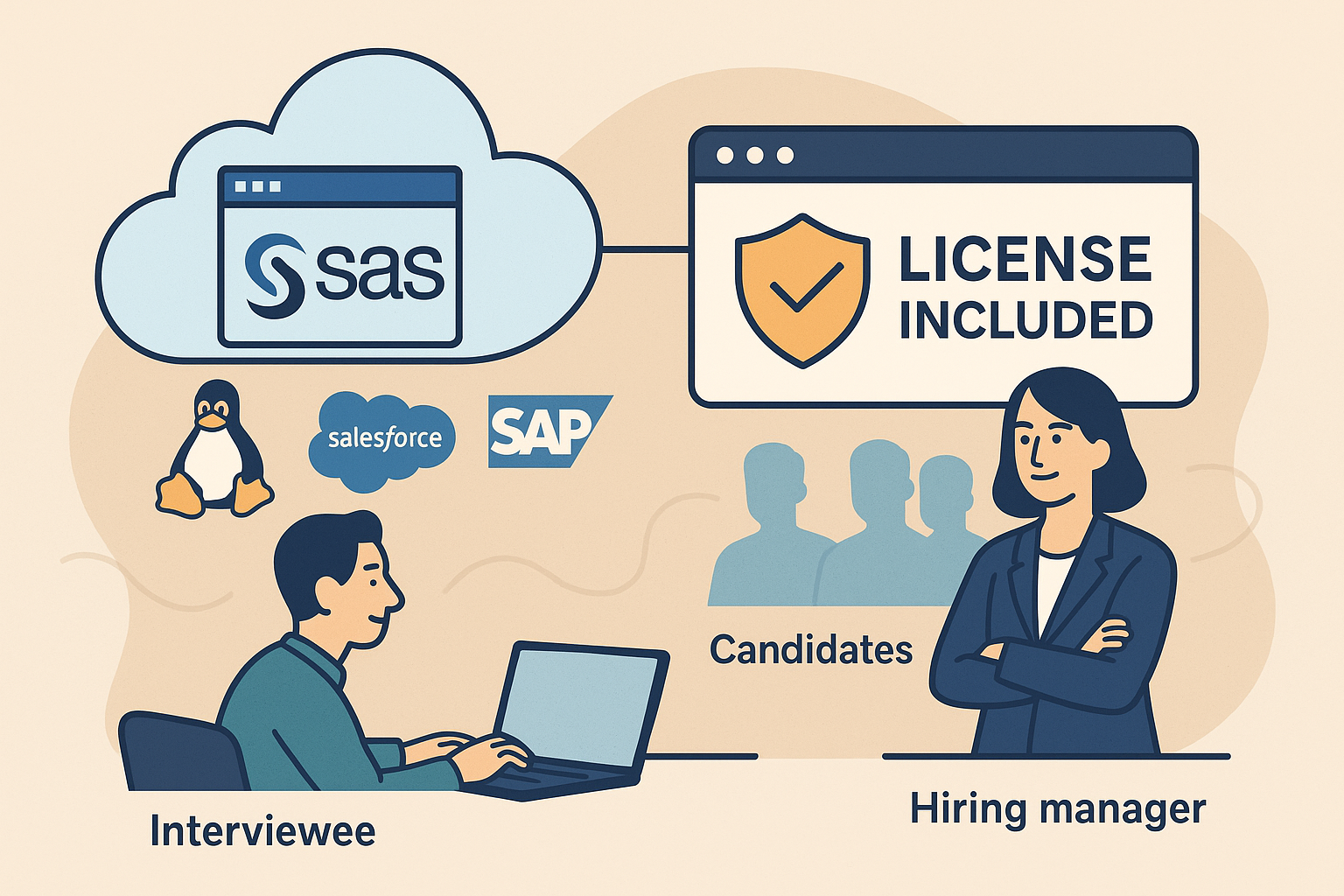The Resume is Dead. Long Live the Skill.
Resumes were never perfect. But in today’s world of AI-generated content, credential inflation, and remote-first work, they’ve gone from flawed to flat-out misleading.
Job titles are vague. Degrees don’t reflect day-one readiness. And let’s be honest—candidates are using every tool at their disposal (including ChatGPT and resume optimization software) to look good on paper. That’s not fraud. That’s survival. But it means one thing for your hiring process:
You need to verify skills, not just scan resumes.
Skill verification is the fastest way to identify top candidates, reduce bias, and protect your hiring pipeline from bad-fit or misrepresented talent. Here are 8 (okay, 11) reasons why smart hiring teams are investing in skill verification now.
1. Resumes Are Marketing, Not Evidence
Candidate Case: A customer success rep listed “strategic account management” on their resume—but couldn’t articulate the difference between churn and expansion during the async interview. Feenyx flagged the mismatch immediately.
Hiring Team Insight: “We realized we were hiring great storytellers, not great team members. Skill verification changed that.”
Resumes are built to impress, not inform. They’re full of buzzwords, vague claims, and often, direct copy-paste from job descriptions. You wouldn’t buy software based on a slide deck. So why hire people that way?
Skill verification flips the model: show us, don’t tell us. Whether it’s through simulations, work samples, or structured responses, you get proof—not promises.
2. The Rise of AI Makes Everyone Sound Good
Assessment Outcome: Feenyx detected LLM-style writing in 19% of open-ended responses during a recent sales hiring sprint. Candidates were using AI tools to pass assessments—not to showcase actual thinking.
Generative AI is a productivity tool—but it’s also a deception risk. When a candidate uses ChatGPT to answer a product strategy question, you’re not assessing their knowledge. You’re assessing their prompt-writing skills.
Feenyx identifies when AI tools are in play—and whether that use is strategic or suspicious. It’s not about banning AI. It’s about understanding when a candidate is leaning too hard on it to get through the door.
3. Remote Work Increases the Fraud Window
Candidate Case: An ops manager applicant passed a complex async assessment with flying colors. But Feenyx flagged the session: IP from outside the listed region, multiple browser tab switches, and evidence of a second person on video. They were being coached live.
Remote hiring removed the handshake and the eye contact. It also removed most of your fraud detection capabilities—unless you have tools like Feenyx in place.
With the right system, you can flag suspicious behavior (tab-switching, identity mismatch, multiple faces on camera) and know when a clean-looking submission needs a second look.
4. Interviews Don’t Predict On-the-Job Success
Interviews are imperfect at best, and biased at worst. They often favor the most charismatic, most practiced, or most culturally “aligned” candidate—not the most capable one.
Process Shift: One Feenyx customer replaced the first round of interviews with async scenario simulations. Hiring manager satisfaction jumped 35%—and the diversity of finalist candidates improved by 2.4x.
Structured skill evaluations give you signal before the conversation starts—so your interview is based on insights, not instincts.
5. Verification Helps Spot Hidden Talent
Candidate Case: A customer support applicant without a college degree beat out two Ivy League competitors on a skills-based assessment. Her resume might’ve been filtered out by legacy systems—but her performance spoke volumes.
When you lead with skills, you discover people you would’ve overlooked. The great self-taught developer. The veteran shifting into marketing. The parent re-entering the workforce with fresh but undocumented skills.
Hiring for skill opens the door to stronger, more diverse pipelines. That’s good for business—and even better for outcomes.
6. Skill Mismatch Is a Retention Killer
Hiring someone who can’t do the job doesn’t just waste your recruiting budget—it drives attrition.
Hiring Team Insight: “We realized most of our exits in the first 90 days were actually bad fits we should’ve caught during hiring. Skill verification fixed that.”
Feenyx lets you simulate the job before it begins—so candidates know what they’re walking into, and you know who’s ready for the role.
7. Teams Are Drowning in Resumes
In an era of layoffs and AI-fueled job applications, your team isn’t reading every resume. They’re scanning. Or worse, filtering by keywords.
Process Shift: A global SaaS company implemented Feenyx skill assessments at the top of funnel. Their recruiter-to-candidate ratio went from 1:75 to 1:12—and time to shortlist dropped by 48%.
Skills-first hiring turns your high-volume pipeline into a high-signal one.
8. Skill Verification Supports DEI in Action
Diversity hiring isn’t just about sourcing—it’s about selection. And traditional methods are riddled with bias.
Feenyx anonymizes data, focuses on real work, and levels the playing field. Whether it’s removing pedigree from consideration or flagging biased scoring patterns, skill verification helps ensure equity isn’t just a talking point—it’s built into the process.
Assessment Outcome: One team found that skill-based hiring doubled their interview rate for underrepresented candidates—without lowering their performance bar.
9. Fraud Detection Isn’t Optional Anymore
From fake identities to ChatGPT-overwritten assessments, modern hiring fraud is sophisticated, subtle, and shockingly common.
Feenyx catches what legacy platforms miss:
- Location mismatches
- Open tab detection
- Mouse exits during test sessions
- AI-generated answer patterns
- Multiple faces on webcam
And it does it all without disrupting your flow. That’s skill verification *and* integrity analysis, all in one.
10. Candidates Expect Better, Faster Processes
Candidate Case: A mid-career product marketer told us: “I’m done doing 5 rounds of interviews just to find out I’m not a fit. I’d rather just show you I can do the job.”
Today’s candidates are more informed, more skeptical, and less patient. They want a hiring experience that respects their time and demonstrates clarity.
Feenyx helps you offer just that—clear expectations, fast evaluations, and transparent next steps, all backed by data.
11. Every Role is Now a Hybrid Role
Hard skills. Soft skills. Writing. Strategy. Communication. AI awareness. Judgment. The bar for success is higher than ever—and more multidimensional.
Feenyx lets you evaluate all of it.
Whether it’s a live interview with co-pilot note-taking, an async scenario with fraud detection, or a resume upload with skills scoring, Feenyx gives you the full picture of what a candidate can actually do.
That’s not just verification. That’s hiring superpowers.
The Future of Hiring is Skill-Verified
You can’t afford to hire based on gut feel anymore. You can’t assume a resume is honest. You can’t interview like it’s 2015.
But you *can* verify skills. You *can* make smarter decisions faster. And you *can* give your hiring team the clarity they’ve been missing.
Feenyx gives you the tools to see the truth behind every candidate—so you stop guessing and start hiring with confidence.
Ready to leave resume roulette behind? Start your free trial and experience skill verification that’s fast, fraud-aware, and built for modern hiring.





